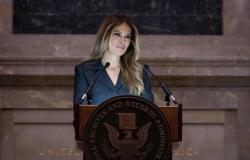The head of American diplomacy, Antony Blinken, is expected in Saudi Arabia on Monday. The window of opportunity for a historic deal that would see the Gulf monarchy recognize Israel is increasingly narrow, analysts say.
The secretary of state’s visit to the Saudi capital Riyadh comes nearly seven months after the start of the war in Gaza on October 7, which put a damper on what could have been a major success for President Joe Biden in matters of foreign policy.
It also comes before the American presidential election in November in which Joe Biden is running, an electoral calendar which could torpedo the progress made so far in the Saudi-Israeli normalization process.
In September, before the unprecedented Hamas attack in Israel, which sparked the war in Gaza, Saudi Crown Prince Mohammed bin Salman said he “bring closer every day” of an agreement supposed to also strengthen the security partnership between Washington and Riyadh.
But the 38-year-old prince, de facto leader of the kingdom, also stressed the importance of the Palestinian question. “We must make life easier for the Palestinians,” he declared.
As fighting drags on in Gaza and mediators struggle to secure a truce, Saudi officials are emphasizing more than ever the need to create a Palestinian state.
In January, the kingdom’s ambassador to Washington, Princess Reema bint Bandar al-Saud, told the World Economic Forum that normalization would be impossible without a path “irrevocable” towards the creation of this State.
“Price of standardization”
While it is not surprising that Saudi Arabia would link its relations with Israel to a resolution of the Israeli-Palestinian conflict, “the price of normalization, particularly on the Palestinian front, has certainly increased”estimates Saudi analyst Aziz Alghashian.
“What we can say is that we need something more tangible than theoretical. More than simple promises”he adds.
Saudi Arabia, home to two of Islam’s holiest sites, has never recognized Israel and did not join the 2020 U.S.-brokered Abraham Accords, which saw its neighbors of the Gulf (Bahrain and the United Arab Emirates) as well as Morocco, establish formal ties with Israel.
During his first campaign, President Joe Biden promised to deal with Saudi Arabia “pariah” because of its human rights record. But since its visit to Jeddah in 2022 and its meeting with the crown prince, the American administration has been working to find a compromise which would build on the Abraham Accords, the diplomatic success of its predecessor, Donald Trump.
The Saudis, however, let them know that they would be more demanding than their neighbors, demanding in particular security guarantees from Washington and its help on a civil nuclear program with a uranium enrichment capacity.
In the months following this visit, Israeli and American officials have increased their optimistic statements, while the Saudis have been more discreet.
For Elham Fakhro, of the Chatham House think tank, “Saudi Arabia is aware of the Biden administration’s desire to reach an agreement”. And Riyadh “is also aware that no other Arab country has as much weight as it to lobby in favor of the Palestinians”she emphasizes.
But the Hamas attack on October 7 in Israel, which resulted in the deaths of 1,170 people according to an AFP count based on official Israeli data, derailed the process.
Israeli reprisals, which have left more than 34,000 dead in Gaza, are regularly denounced by Riyadh, which again this week accused Israeli forces of committing acts of violence. “heinous and uncontrolled war crimes”.
Difficult conditions
Even before the war in Gaza, a Saudi-Israeli-American agreement was not obvious.
“The United States will have to concede something and none of Saudi Arabia’s conditions (or demands) are easy”affirms Elham Fakhro, emphasizing in particular that“a defense pact will have to go through Congress” American.
“His approval is far from certain”adds the researcher, especially in an electoral context in the United States making bipartisan agreements even more difficult.
On the Palestinian side, an imminent breakthrough also seems unlikely, with Israeli Prime Minister Benjamin Netanyahu clearly displaying his opposition to the creation of a Palestinian state.
However, recalls Saudi analyst Hesham Alghannam, “Saudi Arabia has been clear from the start: addressing the Israeli-Palestinian conflict in a way that satisfies the Palestinians is a precondition for normalization with Israel”.






